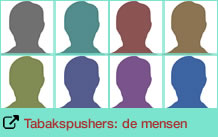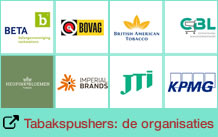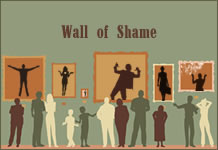Doctors issue enforcement request against Snapchat for vape dealers
27 August 2025
UPDATE 09-09-2025
UPDATE 27-08-2025
After doctors in the Netherlands asked Snapchat in June for measures against vape and tobacco dealers, little has changed, according to research by a youth panel. Teenagers still know how to easily find dealers. That is why an enforcement request has been submitted to the Dutch Authority for Consumers and Markets.
By the web editors
Despite promises from Snap BV in the Netherlands to tackle the trade in illegal nicotine products via Snapchat, young people can still easily find dealers through the platform. This is the conclusion of research with a special youth panel, carried out by doctors from the Leiden University Medical Center (LUMC) and the Antoni van Leeuwenhoek cancer hospital (AVL) in Amsterdam. Youth Smoking Prevention (YSP) therefore submitted an official enforcement request to the Netherlands Authority for Consumers and Markets (ACM) on August 22.
On June 5, 2025, YSP in collaboration with Vapen #jouwkeuze (Vaping #your choice), the LUMC, the AVL, the Health Funds for a Smoke-Free Netherlands and lawyers from De Roos Advocaten en Notariaat demanded in an urgent letter that Snap should better protect children against the large-scale illegal trade in vapes, cigarettes and nicotine pouches. After written contact on June 20 and a meeting on July 2, Snap responded by letter on August 8. In it, the company stated that it has implemented various measures, including improved detection of slang words and emojis that dealers use, account blocks, filters for teenagers, and additional parental controls. Snap requested confidentiality of the details in that letter.
Youth panel investigated dealers
Because Snap does not provide access to internal data that can show that the illegal trade has indeed been reduced, doctors Danielle Cohen (pulmonary pathologist LUMC) and Frank Borm (pulmonologist AVL), the initiators of the Vapen #jouwkeuze teaching package, decided to do a reality check. And because search results for young people differ from those for adults, they called in a youth panel together with student Laurine Beele. Fifteen young people (13-18 years old) carried out systematic searches on two occasions — before and after August 8 — with 16 terms for nicotine products, including slang words that young people themselves suggested.
Measures have no effect
The youth panel research shows that Snap’s measures have had no effect in practice. The average number of dealers found remained almost the same: before August 8, young people recognised an average of 55 dealers per person, and after August 8 even 56.
Although words that Snap claims to monitor (such as ‘vape’) do not yield many hits, newer slang words such as snabba and gerroes as well as emoji’s of a little cloud or a cigarette help to find dealer accounts easily. Even words like cigarette butt, tobacco and cigarette still yield many hits, so that the trade continues undisturbed. This means that the risk for children remains high. After all, Snapchat is popular among very young users, who still easily can come into contact with sellers of toxic and addictive nicotine products.
Dealer offers 60,000 puff vape
To check whether the accounts found were from real dealers, one of the teenagers from the youth panel contacted five accounts. In four out of five cases, the accounts did indeed offer nicotine products. For example, one dealer sold illegal nicotine pouches in different flavours, while two other dealers offered vapes with 50,000 and 60,000 puffs respectively – the equivalent of dozens of packs of cigarettes worth of nicotine. A fourth dealer went one step further and offered cannabis products in addition to vapes.
‘Supply of nicotine is unacceptable’
“Snapchat says it takes the problems seriously, but this research shows that the promised measures do not make any noticeable difference,” says pulmonologist and YSP chair Wanda de Kanter. “Teenagers still come into contact with dealers who offer them products with dangerous amounts of nicotine with a few clicks. That is unacceptable, especially given the serious health risks of all forms of nicotine for young people.”
Pulmonary pathologist Danielle Cohen also warns against nicotine: “The damage nicotine causes to teenagers is so staggering – from severe addiction to life-threatening lung diseases – that Snap should be much stricter. Now, Snapchat is simply not a safe place for minors.”
Enforcement request to ACM
Because the situation remains unchanged, YSP has now submitted an official enforcement request to ACM on behalf of the other parties. The foundation argues that Snapchat is acting in violation of the European Digital Services Act, by not taking sufficiently effective measures against illegal trade in nicotine products on the platform.
The ACM has a ‘fundamental duty to enforce’: in the event of a clear violation, the regulator must, in principle, act. YSP emphasizes that the findings of the youth panel show conclusively that Snapchat is structurally used for the illegal sale of nicotine products to minors. This gives ACM a clear responsibility to take enforcement action and to ensure that children are better protected.
UPDATE 27-08-2025
Snap has stated in several news reports that it shares the doctors’ concerns and has taken and continues to take measures. However, the platform says it cannot scan private communications for sales, as this violates European law.
UPDATE 09-09-2025
ACM will investigate Snapchat
On 9 September the Authority for Consumers and Markets (ACM) made public its decision to start a DSA investigation into online platform Snapchat in connection with the sale of vaping products to minors on the platform. The ACM will investigate whether Snapchat violates the European Digital Services Act (DSA) by doing too little to protect children against dealers who offer illegal vapes for sale.
Read more on acm.nl










 Stichting Rookpreventie Jeugd is geregistreerd als Algemeen Nut Beogende Instelling (RSIN: 820635315 | KvK: 34333760).
Stichting Rookpreventie Jeugd is geregistreerd als Algemeen Nut Beogende Instelling (RSIN: 820635315 | KvK: 34333760).